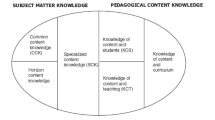Abstract
As part of a research and professional development project that focused on the opportunities and constraints provided by different kinds of mathematical tasks, a group of 67 primary and 40 secondary practising teachers of mathematics were asked to complete a survey focusing on their use of tasks. In this article, we discuss responses to one particular item which sought teachers’ ideas on taking a fraction comparison task (which is larger: 2/3 or 201/301?) and converting it into a mathematics lesson in the middle years of schooling. Drawing upon a number of components of ‘mathematical knowledge for teaching’ as a framework, we attempt to examine those aspects of mathematical knowledge which are involved in making such a conversion. Our recommendation following this analysis is that greater emphasis is necessary in professional development settings on taking a potentially useful task and converting it into a worthwhile mathematics learning experience for students. Knowing the relevant mathematics also seems necessary even if not sufficient to make this conversion.
Similar content being viewed by others

References
Ames, C. (1992). Classrooms: Goals structures and student motivation.Journal of Educational Psychology, 84 (3), 261–271.
Ball, D. L., & Bass, H. (2001). What mathematical knowledge is entailed in teaching children to reason mathematically? In Mathematical Sciences Education Board (Eds.),Knowing and learning mathematics for teaching (pp. 26–34). Washington, DC: National Academies Press.
Ball, D. L., Thames, M. H., & Phelps, G. (in press). Content knowledge for teaching: What makes it special?Journal of Teacher Education.
Bransford, J. B., Brown, A. L., & Cocking, R. R. (Eds.) (1999).How people learn: Brain, mind, experience, and school. Committee on Developments in the Science of Learning, National Research Council. Washington, DC: National Academies Press.
Burkhardt, H., Fraser, R., & Ridgway, J. (1990). The dynamics of curriculum change. In I. Wirszup & R. Streit (Eds.),Developments in school mathematics around the world (Vol. 2, pp. 3–30). Reston, VA: National Council of Teachers of Mathematics.
Christiansen, B., & Walther, G. (1986). Task and activity. In B. Christiansen, A.G. Howson, & M. Otte (Eds.),Perspectives on mathematics education (pp. 243–307). Holland: D. Reidel.
Clarke, D. M., Sukenik, M., Roce, A., & Mitchell, A. (2006) Assessing fraction understanding using task-based interviews.Proceedings of the Conference of the International Group for the Psychology of Mathematics Education, Prague, 2, 337–344.
Fredericks, J. A., Blumfield, P. C., & Paris, A. H. (2004). School engagement: Potential of the concept, state of the evidence.Review of Educational Research, 74 (1), 59–110.
Gehrke, N. K., Knapp, M. S., & Sirotnik, K. A. (1992). In search of the school curriculum.Review of Research in Education, 18, 51–110.
Hiebert, J., & Wearne, D. (1997). Instructional tasks, classroom discourse and student learning in second grade arithmetic.American Educational Research Journal, 30 (2), 393–425.
Hill, H. C., Ball, D. L., & Shilling, S. G. (2008). Unpacking pedagogical content knowledge: Conceptualising and measuring teachers’ topic-specific knowledge of students.Journal for Research in Mathematics Education, 39 (4), 372–400
Hill, H. C., Rowan, B., & Ball, D. L. (2005). Effects of teachers’ mathematical knowledge for teaching on student achievement.American Educational Research Journal, 42 (2), 371–406.
Hollingsworth, H., Lokan, J., & McCrae, B. (2003).Teaching mathematics in Australia: Results from the TIMSS video study (TIMSS Australia Monograph No. 5). Camberwell, Victoria: Australian Council for Educational Research.
National Council of Supervisors of Mathematics (2007).Improving student achievement by leading sustained professional learning for mathematics content and pedagogical knowledge development (The NCSM Improving Student Achievement Series, No. 2). Golden, CO: NCSM.
Robitaille, D. F., Schmidt, W. H., Raizen, S., McKnight, C., Britton, E., & Nicol, C. (1993).Curriculum frameworks for mathematics and science (TIMSS Monograph No. 1). Vancouver: Pacific Educational Press.
Shulman, L. S. (1986). Those who understand: Knowledge growth in teaching.Educational Researcher, 15 (2), 4–14.
Stein, M.K., & Lane, S. (1996). Instructional tasks and the development of student capacity to think and reason and analysis of the relationship between teaching and learning in a reform mathematics project.Educational Research and Evaluation, 2 (1), 50–80.
Stein, M. K., Grover, B. W., & Henningsen, M. (1996). Building student capacity for mathematical thinking and reasoning: An analysis of mathematical tasks used in reform classrooms.American Educational Research Journal, 33 (2), 455–488.
Thames, M. H. (2006).Using math to teach math: Mathematicians and educators investigate the mathematics needed for teaching (Critical Issues in Mathematics Education Series, Volume 2). Berkeley, CA: Mathematical Sciences Research Institute.
Author information
Authors and Affiliations
Rights and permissions
About this article
Cite this article
Sullivan, P., Clarke, D. & Clarke, B. Converting mathematics tasks to learning opportunities: An important aspect of knowledge for mathematics teaching. Math Ed Res J 21, 85–105 (2009). https://doi.org/10.1007/BF03217539
Issue Date:
DOI: https://doi.org/10.1007/BF03217539



